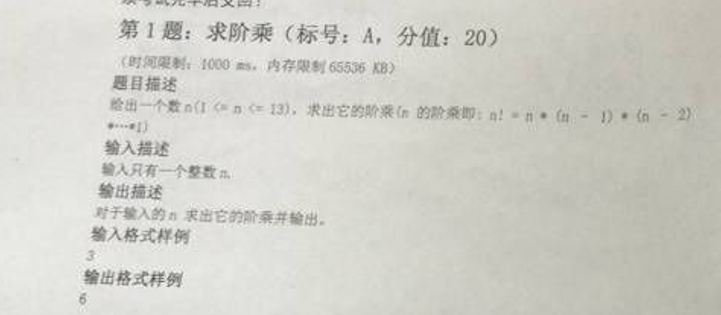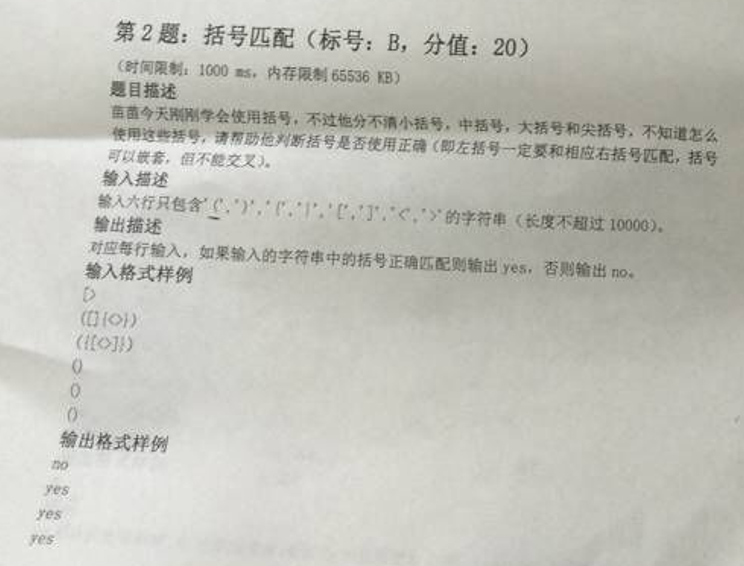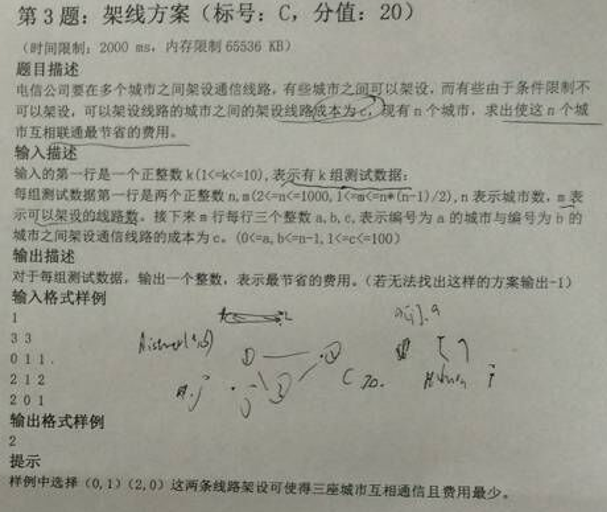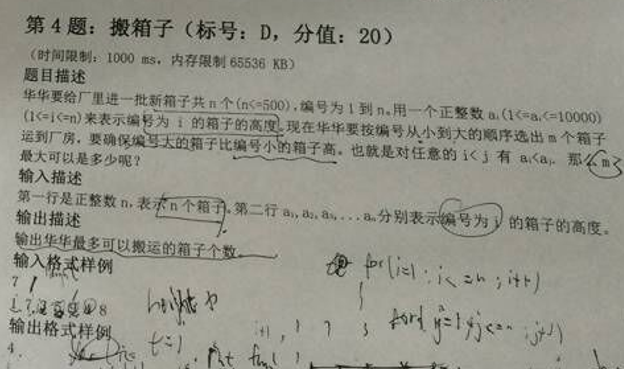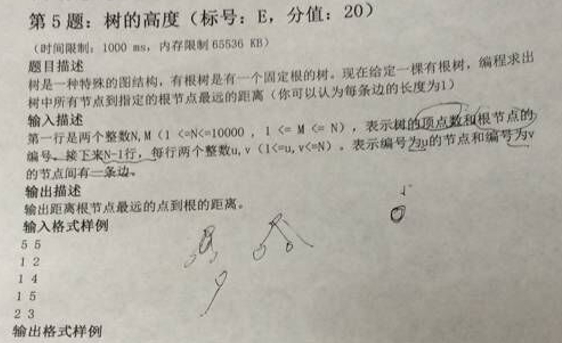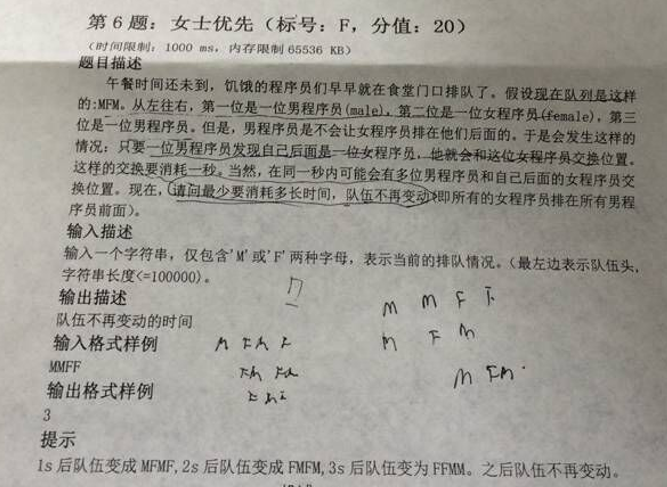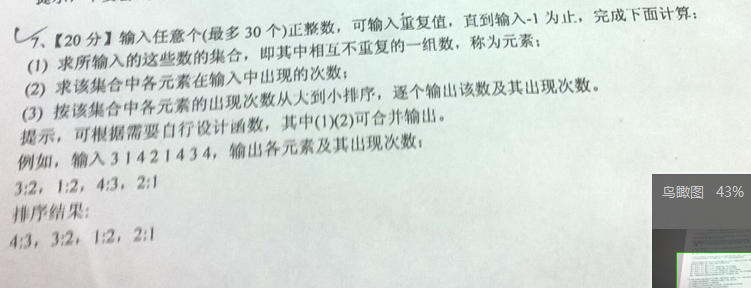2016
1. 求阶乘
答案:
普通求阶乘的题目,但是需要注意的是 int 可最大表示 12! 但题目要求 1《=n<=13 所以建议long类型
package t2016;
public class q1 {
// 因为n《=13,注意溢出,所以用long
public static long fact(int n) {
long ret = 1;
if(n<=1) {
return 1;
}
while(n>=2) {
ret = ret * n;
n--;
}
return ret;
}
public static void main(String[] args) {
System.out.println(fact(13));
}
}
2. 括号匹配
答案:
通过栈来检测,有如下几种情况
1)错误:栈非空,栈顶内容与右侧不匹配
2)错误:遍历完毕,栈非空,如<<<
3)错误:栈空时,遇到右侧,如>
4)正确:遍历完毕,没有遇到错误,且栈为空;
#include <iostream>
#include <string>
#include <vector>
#include <stack>
using namespace std;
/* run this program using the console pauser or add your own getch, system("pause") or input loop */
bool isOk(string str)
{
stack<char> st;
for(int i=0; i<str.length(); i++)
{
char p = str[i];
if(p=='[' || p=='{' || p=='(' || p=='<')
{
st.push(p);
}
else
{
// 遇到右侧,且栈空
if(st.empty()) return false;
else
{
char temp = st.top();
// 括号匹配, 退栈
if((p==']'&&temp=='[') ||
(p=='}'&&temp=='{') ||
(p==')'&&temp=='(') ||
(p=='>'&&temp=='<'))
{
st.pop();
}
}
}
}
if(st.empty()) return true;
else return false;
}
int main(int argc, char** argv) {
string str;
string ret[6];
int loop = 1;
for(int i=0; i<loop; i++)
{
cin>>str;
if(isOk(str)) ret[i] = "yes";
else ret[i] = "no";
}
for(int i=0; i<loop; i++)
{
cout<< ret[i] << endl;
}
return 0;
}
3. 架线方案 图Prim算法
4. 搬箱子 动态规划
答案:
dp[i]表示以i结尾的子序列中LIS的长度。然后我用dp[j](0<=j<i)来表示在i之前的LIS的长度。然后我们可以看到,只有当a[i]>a[j]的时候,我们需要进行判断,是否将a[i]加入到dp[j]当中。为了保证我们每次加入都是得到一个最优的LIS,有两点需要注意:第一,每一次,a[i]都应当加入最大的那个dp[j],保证局部性质最优,也就是我们需要找到max(dp[j](0<=j<i));第二,每一次加入之后,我们都应当更新dp[j]的值,显然,dp[i]=dp[j]+1。 如果写成递推公式,我们可以得到
if(dp[i] >= dp[j]) dp[i] = max{dp[i], dp[j]+1}
else dp[i] = dp[i]。
于是我们就能够得到O(n^2)的动态规划方法的实现:
测试用例:
输入:
7
1 7 3 5 9 4 8
输出:4
#include <iostream>
#include <string>
#include <vector>
#include <stack>
#include <stdio.h>
using namespace std;
/* run this program using the console pauser or add your own getch, system("pause") or input loop */
int LIS(int n, int A[]);
//Longest Increasing Subsequence)最长上升子序列
int LIS(int n, int A[])
{
int dp[n], temp;
dp[0] = 1;
for(int i=0; i<n; i++)
{
dp[i] = 1; // 初值
for(int j=0; j<i; j++)
{
// 递推关系式 dp[i]=max{ dp[i], dp[j](0<=j<i))+(a[i]>a[j]?1:0 }
if(A[i] > A[j])
{
temp = dp[j] + 1;
dp[i] = max(dp[i], temp);
}
}
}
return dp[n-1];
}
int main() {
int n, ret, A[1000];
cin>> n;
for(int i=0; i<n; i++)
{
scanf("%d", &A[i]);
}
ret = LIS(n, A);
cout<< ret << endl;
return 0;
}
5. 树的高度 图的遍历
答案:
即是图的邻接矩阵,DFS即可
注意,问的是距离根节点最远的距离,所以是树的高度h-1
#include <iostream>
#include <string>
#include <vector>
#include <stack>
#include <stdio.h>
using namespace std;
/* run this program using the console pauser or add your own getch, system("pause") or input loop */
void initGraph(int n);
int DFS(int n, int root, bool visit[]);
/* 输入样例, output:3
5 5
1 2
1 4
1 5
2 3
*/
#define MAX 999
int G[MAX][MAX];
void initGraph(int n)
{
for(int i=0; i<n; i++)
{
for(int j=0; j<n; j++) G[i][j]=0;
}
}
int DFS(int n, int root, bool visit[])
{
visit[root] = true;
int maxSubH = 0, subH;
for(int i=1; i<n; i++)
{
if(G[root][i]==1 && visit[i]==false)
{
subH = DFS(n, i, visit);
if(subH > maxSubH) maxSubH = subH;
}
}
return maxSubH+1;
}
int main() {
int N,n, root, x, y, h, dist;
cin>> N>> root;
n = N + 1;
initGraph(n);
// 还有N-1行
for(int i=0; i<N-1; i++)
{
cin>> x>> y;
G[x][y] = 1;
G[y][x] = 1;
}
bool visit[n] = {false};
// h是树的高度,但求的是最远的距离,所以要-1
h = DFS(n, root, visit);
dist = h-1;
cout<< dist<<endl;
return 0;
}
6. 女士优先 字符串替换
答案:
字符串替代问题,每次检查字符串是否含有“MF”,若有,则将字符串所有的 MF 更新为
FM 即可。
注意:string的库用<string.h>,cpp的库容易出问题
#include <iostream>
#include <vector>
#include <stack>
#include <string.h>
#include <stdio.h>
using namespace std;
/* run this program using the console pauser or add your own getch, system("pause") or input loop */
//int detect()
void mySwap(string str, int p1, int p2)
{
char temp;
temp = str[p1];
str[p1] = str[p2];
str[p2] = temp;
}
int main() {
char str[20];
int p1, p2, loop=0;
bool flag;
cin >> str;
cout << str<< endl;
int length=strlen(str);
while(true)
{
p1 = 0;
p2 = 1;
flag=false;
while(p2<length)
{
if (str[p1]=='M' && str[p2]=='F')
{
char temp=str[p1];
str[p1]=str[p2];
str[p2]=temp;
flag=true;
}
p1++;
p2++;
}
loop++;
if(flag == false) break;
}
cout<< loop<< endl;
cout<<str<<endl;
return 0;
}
2015
1. 提取数字位数
输入一个十进制正整数,输出其十进制各位数的和。
例如,输入3,输出3,;输入23,输出5
答案:
迭代各个位数,提取结果
#include <iostream>
#include <vector>
#include <stack>
#include <string.h>
#include <stdio.h>
using namespace std;
/* run this program using the console pauser or add your own getch, system("pause") or input loop */
int main() {
int n, sum=0, rest;
cin >>n;
rest = n;
while(rest != 0)
{
sum += rest%10;
rest = rest / 10;
}
cout<< sum;
return 0;
}
2. 母牛生产问题 easy
母牛生产问题,第一年有一头小母牛,3年之后每头母牛每年都生一只小母牛,假设都不死。第n(n>=1)年之后一共有多少头母牛?输出n从1-20的母牛数量
答案:
即每隔3年,数量翻倍一次
#include <iostream>
#include <vector>
#include <stack>
#include <string.h>
#include <stdio.h>
using namespace std;
/* run this program using the console pauser or add your own getch, system("pause") or input loop */
int main() {
int sum = 1, i=1;
for(; i<=20; i++)
{
if(i!=1 && (i-1)%3==0) sum*=2;
cout<<i<<"年: "<< sum<< endl;
}
return 0;
}
3. 运动员
答案:
因为N<100,所以最多分13组;用grp表示组数,用A[]数组存储每个组的人数,rest表示余数;即只要前rest个组每个组人数+1,则正好满足;
#include <iostream>
#include <vector>
#include <stack>
#include <string.h>
#include <stdio.h>
using namespace std;
/* run this program using the console pauser or add your own getch, system("pause") or input loop */
int main() {
int A[13];
int N, grp, m, rest;
cin>> N;
grp = N/8+(N%8==0?0:1);
m = N / grp;
rest = N % grp;
for(int i=0; i<grp; i++)
{
A[i] = m;
if(i<rest) A[i]++;
// output
printf("%d ", A[i]);
}
}
4. 十进制数各个位数
答案:
IDE:devc;就是各个位数,循环
#include <iostream>
#include <stdio.h>
using namespace std;
/* run this program using the console pauser or add your own getch, system("pause") or input loop */
int main(int argc, char** argv) {
int temp = 0, sum = 0, a, n;
cin>> a>> n;
for(int i=0; i<n; i++)
{
temp = 10*temp + a;
sum += temp;
}
cout<<sum<<endl;
return 0;
}
5. 素数
答案:
1. for循环,遍历2-100,给所有数标记是否是素数,存于A[]数组
2. for循环如果A[i]和A[i+2]是素数,即为孪生素数对,输出并count++
3. 检测是否为素数的算法为从2到i*i<n;
#include <iostream>
#include <vector>
#include <stack>
#include <string.h>
#include <stdio.h>
using namespace std;
/* run this program using the console pauser or add your own getch, system("pause") or input loop */
bool isPrime(int n);
bool isPrime(int n)
{
if(n==2) return true;
bool flag = true;
for(int i=2; i*i<=n; i++)
{
if(n%i==0)
{
flag = false;
break;
}
}
return flag;
}
int main() {
bool A[101];
int count = 0;
for(int i=2; i<101; i++)
{
A[i] = isPrime(i);
}
for(int i=2; i<101; i++)
{
if(A[i] && A[i+2])
{
printf("%d-%d\n", i, i+2);
count++;
}
}
printf("sum = %d", count);
}
6. 分数化为小数 手动除法
答案:
结果存放到A[], 每次的余数放到rest[],每次计算得到余数之后,把它和rest数组的每一位进行比价,若存在相同,则说明循环到达了尽头;
#include <iostream>
#include <vector>
#include <stack>
#include <string.h>
#include <stdio.h>
using namespace std;
/* run this program using the console pauser or add your own getch, system("pause") or input loop */
int main() {
int val, M, N, begin, end=100;
int A[100], rest[100];
bool flag = false;
cin>> M>> N;
rest[0] = M;
for(int i=0; i<100; i++)
{
val = rest[i] * 10;
A[i] = val/N;
rest[i+1] = val % N;
for(int j=0; j<=i; j++)
{
// 此时为循环点
if(rest[j]==rest[i+1])
{
begin = j;
end = i;
flag = true;
break;
}
}
if(flag==true) break;
}
//output
printf("0.");
for(int i=0; i<=end; i++){
printf("%d", A[i]);
}
printf(" ,start from %d\n", begin+1);
printf("end = %d", end);
return 0;
}
7. 桶的用法,包括排序,计数
答案:
先把数据存入input[]数组,是便于通过scanf和空格读入数据;
注意:前几行scanf中的%d后面不允许空格,否则无法读入数据;
#include <iostream>
#include <vector>
#include <stack>
#include <string.h>
#include <stdio.h>
using namespace std;
/* run this program using the console pauser or add your own getch, system("pause") or input loop */
/*
3 1 4 2 1 4 3 4 -1
*/
int main() {
int bucket[100]={0}, A[30], B[30],input[30], countA=0, countB=0, n, num=0;
// 输入
for(int i=0; i<30; i++)
{
scanf("%d", &input[i]); //注意此处%d后面不允许空格
num++;
if(input[i]==-1) break;
}
//test
// for(int i=0; i<num; i++)
// {
// printf("%d\n", input[i]);
// }
// 输入,装入桶bucket
for(int i=0; i<num; i++)
{
n = input[i];
if(n==-1) break;
// 首次出现 ,存入B
if(bucket[n] == 0)
{
B[countB] = n;
countB++;
}
bucket[n]++;
}
// 输出B
for(int i=0; i<countB; i++)
{
printf("%d:%d ", B[i], bucket[B[i]]);
}
printf("\n");
// A按降序存放
for(int i=99; i>=0; i--)
{
if(bucket[i]!=0)
{
A[countA] = i;
countA++;
}
}
//输出A
for(int i=0; i<countA; i++)
{
printf("%d:%d ", A[i], bucket[A[i]]);
}
return 0;
}
2014
1.输入一个整数转换成二进制输出
如输入3,输出11;输入6,输出110
答案:
采用递归法;
递归基:n=0时,return;
递归策略:每次对n/2调用函数,
末尾:输出 n%2;
#include <iostream>
#include <vector>
#include <stack>
#include <string.h>
#include <stdio.h>
using namespace std;
/* run this program using the console pauser or add your own getch, system("pause") or input loop */
void toBinary(int n);
// 递归方法
void toBinary(int n)
{
if(n==0) return;
toBinary(n/2);
printf("%d", n%2);
}
int main() {
int n;
cin>>n;
toBinary(n);
return 0;
}
2. int型和double型的比较
试想32位整型数据所能表示的最大数阶乘。假设y=x!,在32位整型内,x最大为多少y不溢出,输出x和y的值。
答案:
用MAX_INT表示最大int型数,将其转为double,再将其为double类型的
#include <iostream>
#include <vector>
#include <stack>
#include <string.h>
#include <stdio.h>
using namespace std;
/* run this program using the console pauser or add your own getch, system("pause") or input loop */
void toBinary(int n);
double jie(int num)
{
if(num==0)
return 1;
else
return num*jie(num-1);
}
int main() {
int maxint=INT_MAX;
int num=0;
while(jie(num)<=maxint)
{
num++;
}
cout<<"保证阶乘不溢出的整型数据最大为\n"<<num-1<<"\n其阶乘为:\n"<<maxint<<endl;
return 0;
}
今天的文章南京理工-机试真题分享到此就结束了,感谢您的阅读。
版权声明:本文内容由互联网用户自发贡献,该文观点仅代表作者本人。本站仅提供信息存储空间服务,不拥有所有权,不承担相关法律责任。如发现本站有涉嫌侵权/违法违规的内容, 请发送邮件至 举报,一经查实,本站将立刻删除。
如需转载请保留出处:https://bianchenghao.cn/60525.html

